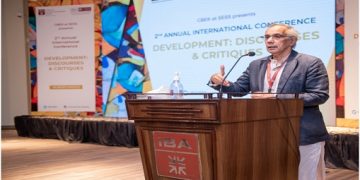KARACHI, March 25: The School of Economics and Social Sciences (SESS), in collaboration with the Center for Business and Economic Research (CBER) at the IBA Karachi, hosted the 2nd Annual International Conference titled, ‘Development: Discourses and Critiques’. The three-day conference is taking place from March 25-27, 2022 at the IBA Karachi, Main Campus.
This year’s theme invites works from a wide range of disciplines to critique, question and reconsider the experiences of transnational, national and sub-national actors with the development process. What does ‘development’ mean for different actors, and how has this narrative shifted over time? How does development define and redefine power relations and what implications does this have for different groups? How have colonial experiences shaped futures and how does one deconstruct ideas rooted in these experiences?
To encourage innovative and diversity within modes of thinking, the conference is hosting presenters and participants from diverse backgrounds, including Skardu, Sukkur, Gilgit, Quetta, and Islamabad from Pakistan, and multiple professors from esteemed universities from the USA.
By centering radical subthemes, including but not limited to, decolonial and feminist frameworks, this conference aims to center critical perspectives that help us gain a nuanced understanding of social change and development.
The first keynote speaker was Dr. MushfiqMobarak, Professor of Economics, Yale University, USA. He spoke in depth on ‘Seasonal Poverty and Seasonal Migration’. The session was moderated by AroojWaheed Dar, Lecturer, SESS, IBA Karachi. Dr. Mobarak recognized the forms of poverty that emerge during seasonal changes and highlighted its implications, specifically in the form of seasonal hunger. The second section of the address focused on the attempts that help address this problem through structural strategies such as micro-loans that help bridge the financial strain in the lean season.
The first panel discussion of Day 1 was titled ‘Institutions, Governance and Inequalities’ which included the following four scholars: Dr. Sultan Mehmood, New Economic School, Moscow; Dr. AbidAmanBurki, Senior Research Fellow, MahbabulHaq Research Centre, Lahore University of Management Sciences; Dr. HafeezJamali, Senior Anthropologist and Civil Servant; RobinaAther, Chairperson, National Tariff Commission, and Dr. AsmaHyder, Professor of Economics and Dean, SESS, IBA Karachi.
The session highlighted various statistics on the economic and social inequalities in Pakistan, and also included the inclusion of indigenous communities within the policy-making process, and judicial independence in Pakistan. – PR
- Latest
- Trending





